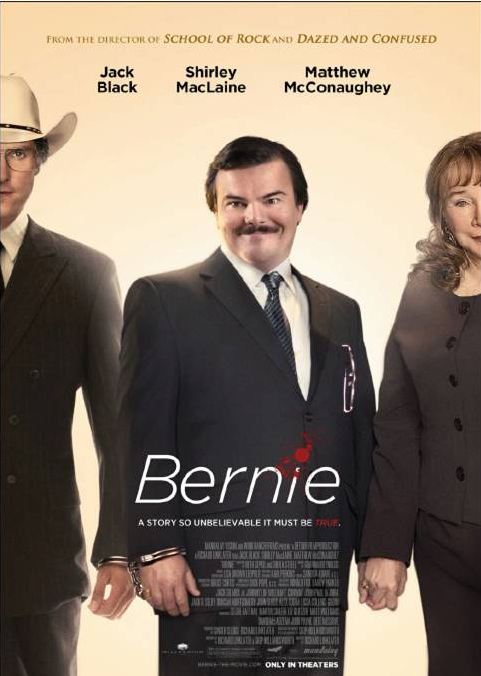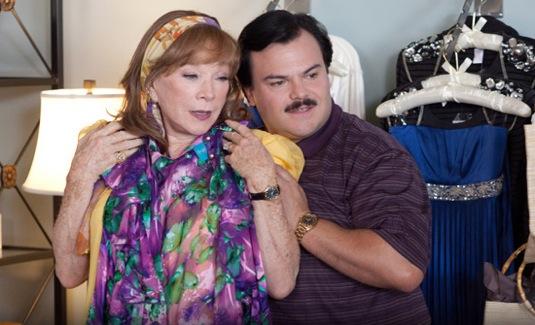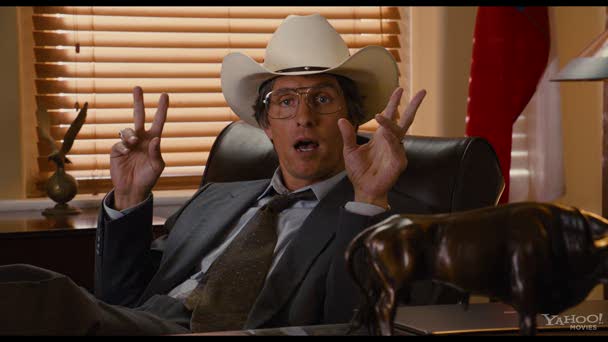|
|
||
|
Bernie
Reviewed by
Damien Straker on
July 28th, 2012 |
8/10 |
|
|
This is based on the true story of Bernie Tiede
(Jack Black), who is the nicest man in the town of Carthage, Texas. He
is an
assistant funeral director, attending to widows and speaking and
singing at
funerals too. The townsfolk of Carthage lavish praise on Bernie for his
unconditional kindness. Yet for all of his goodness, there is equally
as much
innuendo surrounding Bernie's private life. Some people question
whether he is
gay but others believe that he is romantically involved with Marjorie
Nugent
(Shirley MacLaine), a cranky widow who is disliked immeasurably by the
entire
town. She takes full advantage of Bernie's generosity, gradually
enslaving him
with his own generosity. The town is shocked when Bernie, discouraged
by
Marjorie's lack of empathy, shoots the woman in the back repeatedly and
is
imprisoned. The town remains in full support of Bernie but district
attorney
Danny Buck (Matthew McConaughey), who doesn't care how nice Bernie is,
and is
determined to have him sentenced for murder.
Following School of Rock (2006), Richard Linklater's second film starring Jack Black is a black comedy, well-acted, unusual and uproariously funny. There's no irreverence here in turning a true murder into a comedic tale either because there's great intent and purpose to how the humour is used. Linklater, who wrote the screenplay with Skip Hollandsworth, uses the comedic element to bridge the distance between the audience and what is a closed, remote community. Real East Texan citizens are used as extras in the film, which means that the film could not be accused of forgetting their humanity, even when they throw their judgement down on the rest of Texas, which they believe to be divided into discrete parts. "More tattoos than teeth," is how one man describes the jury that Bernie faces in another part of the state. Through the use of comedy, the film amounts to is a story about segregation and the way that people use their personal bonds, like religion, to protect the members of their own private community. Engaging with mockumentary features, including interviews with the Texans, the film is fascinating in its own impartiality and moral ambiguity. Marjorie is characterised as a truly horrible person, played with unrelenting coldness by MacLaine, and seems overtly willing to torment Bernie, using even the slightest mannerisms to antagonise him. But the film never glosses over the fact that he did shoot her repeatedly in the back with a rifle, left her body in a freezer for months and spent her money on the town. The reaction of the community, in defending Bernie, is a more significant subject for the film than taking either side of the law. One of the most darkly funny moments is when a woman states: "He only shot her four times, not five". The ironic tone of the dialogue reveals the arguably elitist nature of the community, and it is their acceptance of Bernie, and not Majorie, which in their eyes elevates him above any wrongdoings.
One of the other fascinating moral questions of
the film stems from the monetary aspect of the crime. Bernie did spend
Majorie's money after her death, not for himself but to help to develop
the
town. He gave money to people so that they could buy children's play
equipment
and also develop a Sunday school at the Methodist church. This asks us
whether
destruction can ever be a form of creation and arguably the town's
support for
this notion appeals to their interpretation and response to the Bible
itself. The
film's moral ambiguity and interest is further balanced by Jack Black's
amusing
and surprising performance. It did take a while for me to warm to him
because
he's flamboyant as I have never seen him like that before and I wasn't
sure at
times whether I was meant to be laughing, especially when he is
singing.
Progressively though, Black shows depth in ways that I would describe
as
delicate and subtle, words not often associated with the big man. The
strength
of his increasingly watchable performance coincides with the
transformation of
his character. In selective close-up shots, Black reveals his gradual
intolerance for Marjorie, as she takes total advantage of him, followed
by the
disillusionment with his own reckless actions. His lack of
self-understanding
and disbelief in himself characterises him tragically but we still
remember
that he is responsible and holds
little explanation. At the other end of spectrum is Matthew McConaughey
who is
very funny as a toothpick chewing district attorney. When asked to
comment on
Bernie he says: "He's angel alright! An angel of death!" That line
brought some big laughs at the screening. Watching him dismantle Bernie
during
the trial proves as tense as any scene from a summer blockbuster. As a
moderately scaled film, this is as dramatic or as emotionally involving
as the
narrative becomes. But unlike a lot of contemporary comedies, there is
an
indispensable subtext regarding the enclosing nature of religious
communities
that belies the film's quirkiness and peculiarity. |
||


